Unit6导学案
人教版八年级上册Unit 6 导学案及答案
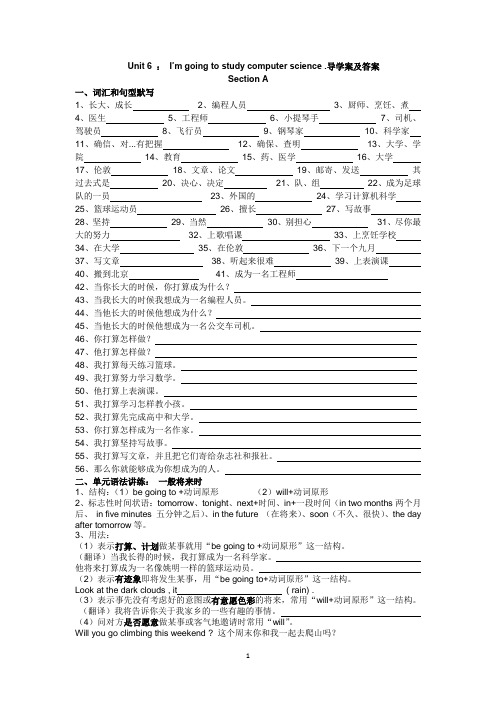
Unit 6 :I’m going to study computer science .导学案及答案Section A一、词汇和句型默写1、长大、成长2、编程人员3、厨师、烹饪、煮4、医生5、工程师6、小提琴手7、司机、驾驶员8、飞行员9、钢琴家10、科学家11、确信、对...有把握12、确保、查明13、大学、学院14、教育15、药、医学16、大学17、伦敦18、文章、论文19、邮寄、发送其过去式是20、决心、决定21、队、组22、成为足球队的一员23、外国的24、学习计算机科学25、篮球运动员26、擅长27、写故事28、坚持29、当然30、别担心31、尽你最大的努力32、上歌唱课33、上烹饪学校34、在大学35、在伦敦36、下一个九月37、写文章38、听起来很难39、上表演课40、搬到北京41、成为一名工程师42、当你长大的时候,你打算成为什么?43、当我长大的时候我想成为一名编程人员。
44、当他长大的时候他想成为什么?45、当他长大的时候他想成为一名公交车司机。
46、你打算怎样做?47、他打算怎样做?48、我打算每天练习篮球。
49、我打算努力学习数学。
50、他打算上表演课。
51、我打算学习怎样教小孩。
52、我打算先完成高中和大学。
53、你打算怎样成为一名作家。
54、我打算坚持写故事。
55、我打算写文章,并且把它们寄给杂志社和报社。
56、那么你就能够成为你想成为的人。
二、单元语法讲练:一般将来时1、结构:(1)be going to +动词原形(2)will+动词原形2、标志性时间状语:tomorrow、tonight、next+时间、in+一段时间(in two months两个月后、in five minutes 五分钟之后)、in the future (在将来)、soon(不久、很快)、the day after tomorrow等。
3、用法:(1)表示打算、计划做某事就用“be going to +动词原形”这一结构。
Unit-6-An-old-man-tried-to-move-the-mountains.导学案

Unit 6 An old man tried to moved the mountains.Section A 1 (1a-2d)教学目标:1. 语言知识目标:1) 能掌握以下单词:remind, bit, silly, instead of能掌握以下句型:①How does the story begin?②What happened next?③What do you think of the story of Yu Gong?④What could Yu Gong do instead of moving the mountains?2.技能目标:能够用英语询问故事的开始、发展及后续等。
能够对故事中的人物或情节发表一些简单的看法或观点。
3. 情感目标:学习愚公,要学习他“主动挖山”的精神。
在我们生活工作中存在着很多的“山”。
在这些山的面前我们应该采取怎样的态度对待它?是通过“搬家”来避开它或找领导请求帮助;还是像愚公一样明知困难却迎难而上,凭借自己的力量勇敢的克服困难。
愚公不畏艰险,不怕困难,勇敢面对的精神,正是值得我们所学习的。
教学重点:1) 掌握本课时中出现的生词:remind, bit, silly, instead of;2) 学会询问故事发展的基本句型:How does the story begin?What happened next?3)学会表达故事中的人物或情节,并发表一些简单的看法或观点。
What do you think of / about the story of Yu Gong?I think it’s a little bit silly.I still don’t agree with you.教学难点:学会表达故事中的人物或情节,并发表一些简单的看法或观点。
教学流程:一、导学领航1. 播放动画片《寓公移山》的视频,导入本单元主题。
T: What’s the name of the story?S1:It’s Yu Gong moves a mountain.S2: It’s a traditional Chinese story.T: Do you know other traditional Chinese stories?S1: Ne Zha Conquers the Dragon KingS2: Magic Brush Ma LianS3: Chang’e Flies to the Moon…二、自主学习1. 引导学生们学习生词。
人教版九年级英语Unit-6导学案
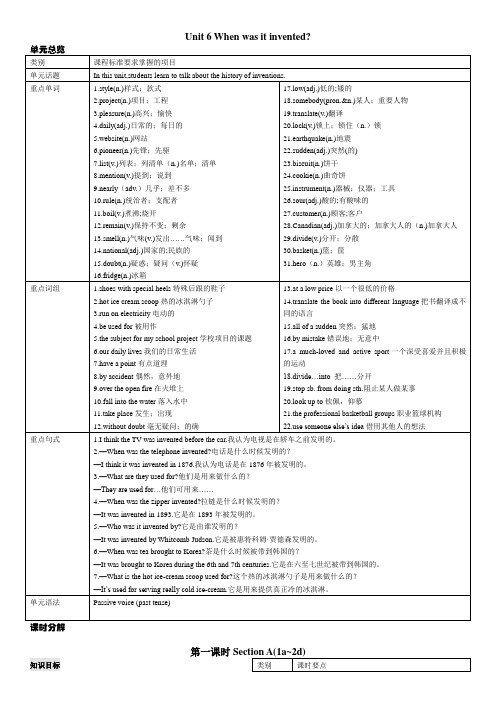
Unit 6 When was it invented?课时分解第一课时知识目标§自主学习方案【新词自查】根据句意及汉语提示完成句子。
1.I like the color of this coat but I don’t like its style (款式).2.It’s my great pleasure (高兴) to have a talk with you.3.The little inventions have helped me a lot in my daily (日常的)life.4.Julia introduced a good website (网站)to me to learn English.5.My mother always lists(列清单)all things that she wants to buy before shopping.§课堂导学方案Step 1情景导入参考案例Teacher: There are many useful things in the world.They help us a lot in life.(Show some pictures on the screen) When were they invented?Students:_______________________________①The telephone was invented in 1876.②The computer was invented in……(4分钟)环节说明:通过课前的一个师生问答互动引入新课的话题;通过图片的展示和语言的描述创设了情境,激发了学生的学习兴趣和表达欲望。
Step 2完成教材1a-1c的任务【操作案例】1.要求学生翻开课本P41,迅速阅读1a部分的内容。
并按要求完成课本上相应的任务。
(1分钟)2.检查答案,要求全班一起给出答案并检查讨论。
新版unit6-I'm-watching-TV-导学案
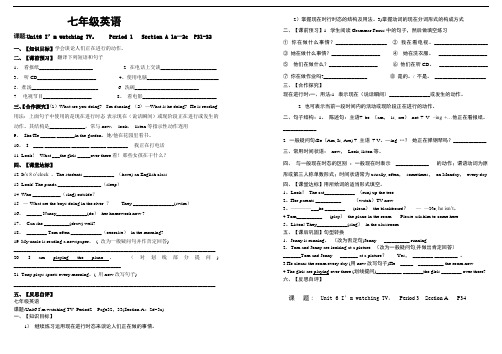
七年级英语课题:Unit6 I’m watching TV。
Period 1 Section A 1a—2c P31-32一、【知识目标】学会谈论人们正在进行的动作。
二、【课前预习】翻译下列短语和句子1。
看报纸_____________________ 2. 在电话上交谈______________________ 3。
听CD_______________________ 4。
使用电脑____________________________ 5.煮汤__________________________ 6. 洗碗_________________________7. 电视节目___________________ 8。
看电影_____________________________三、【合作探究】(1)-What are you doing? - I'm dancing.(2)—What is he doing? -He is reading. 用法:上面句子中使用的是现在进行时态.表示现在(说话瞬间)或现阶段正在进行或发生的动作。
其结构是______________,常与now,look,listen等指示性动作连用.9。
She/He ______ _______in the garden。
她/他在花园里看书。
10。
I ____ __________ _______ ______ ________. 我正在打电话.11. Look!What ___the girls _____over there.看!那些女孩在干什么?四、【课堂达标】12. It’s 8 o’clock 。
The students ____________ (have) an English class.13. Look! The panda _________________(sleep).14. Who ___________(sing) outside?15. -—-What are the boys doing in the river ?---They ________________(swim)16。
九年级U6整单元导学案

Unit 6 When was it invented?Section A 1a-1c第一课时一、把下列句子改成被动语态1. I didn’t lend anybody my books. _____________________________2. Did you send your brother gifts? _____________________________3. She bought her brother a dictionary. _______________________________4. The boy ate the biscuits in two minutes. __________________________5. When did people invent paper? ___________________________________二、用括号内单词的适当形式填空。
6. The telephone _____ ______ (invent) by Bell many years ago.7. English _____ _______ (speak) in China.8. The car ______ _____(make) in China.9. The room must ________ ____(clean) every day.10. --- Is the seat _____________ by anyone? (take) --- No, you can sit here.11. The kind of ballpoint pen ___________ well, so it __________ well, too. (write; sell)12. The thief ___________ by the police and ___________ to prison last month. ( catch; send)13. --- When _________ the swimming club ___________? (set up) --- In 2021.14. ---- What are they doing with the wall now?--- It ___ _______ by some workers at the moment. (paint)15. I ______ _____ that the meeting had to ____ ____ until next week. (tell; put off)三、按照内容完成对话。
七年级英语导学案unit 6 i'm watching Tv

七年级英语导学案Unit 6 I’m watching TV.Section A 1a-1c语言知识目标单词与词组: newspaper, read a newspaper, use, soup, make soup, wash句型: A:What are you doing?B:I’m watching TV.A:What’s he doing? B:He’s using the computer.A:What are they doing? B:They’re listening to a CD.语言技能目标能听懂本课单词、词组及句子,并能运用于实际中情感态度目标让学生乐于英语交际、善于英语交际学习过程What is Ms. Liu doing? Ms. Liu is reading a newspaper.What is Ms. Liu doing? Ms. Liu is watching TV.以小组为单位,学生自学并翻译词组,看谁做得又快又好。
(要求组长带头,全组成员都会译会读,并一一默写过好关。
)1. read a newspaper ______________2. talk on the phone __________________3. listen to a CD _________________4. use the computer __________________5. make soup __________________6. wash the dishes____________________1、写出下列动词的-ing形式watch----- use------ swim-----clean----- make------ run-------wash----- exercise----- get------2、以小组为单位,组内成员一起学习这些动词的-ing形式并总结出变化规律.3、小组汇报展示动词-ing形式的学习情况4、完成1a部分。
六年级上册英语导学案-Unit 6 There are four seasons in a year

六年级上册英语导学案-Unit 6 There are four seasons in a year. Lesson 36|人教(精通)一、教学目标1.能听、说、读、写单词spring, summer, autumn, winter以及句子There are four seasons in a year 。
2.能运用所学知识描述自己喜欢的季节。
3.能阅读短文,理解文章大意,掌握文章中的关键信息。
4.通过学习兴趣爱好,培养学生的文化素养。
二、教学重点和难点1.教学重点:能听、说、读、写单词spring, summer, autumn, winter以及句子There are four seasons in a year。
2.教学难点:能阅读短文,理解文章大意,掌握文章中的关键信息。
三、教学过程1. 导入新课今天我们学习关于季节的话题。
请大家分享一下你们最喜欢的季节是什么,为什么?2. 学生展示请几位同学分享一下自己最喜欢的季节以及原因。
3. 呈现单词在黑板上呈现spring, summer, autumn, winter这四个单词。
请学生跟随老师朗读。
4. 发音练习老师说出单词,学生跟读并模仿老师正确的发音。
5. 学习句型呈现句子There are four seasons in a year。
请学生跟随老师朗读。
6. 模仿句型老师带领学生模仿句子并用不同的答案来回答老师所提出的问题。
例如:Q: How many seasons are there in a year?A: There are four seasons in a year.Q: What are the four seasons?A: The four seasons are spring, summer, autumn and winter.7. 阅读理解请学生阅读文章,并在课本上找出正确的答案。
Winter is a very cold season. It starts in December and ends in February. It often snows in winter. People can go skiing in the snow. Children can make a snowman and have snowball fights. Winter clothes are very warm. We wear a coat, a hat, gloves and boots. It’s important to keep warm in winter.1.What season is it in December, January and February?A. SpringB. SummerC. AutumnD. Winter2.What can people do in the snow?A. They can go swimming.B. They can go hiking.C. They can go skiing.D. They can go sunbathing.3.What kind of clothes do people wear in winter?A. Thin clothes.B. Small clothes.C. Warm clothes.D. Cool clothes.8. 指导学生写作请学生根据自己最喜欢的季节,写一篇50个字的短文。
Unit 6 I'm going to study computer science.导学案

Unit 6 I’m going to study computer science. 导学案第1课时(Section A 1a-3a)班级姓名学习目标:1.熟练运用句型谈论将来意向:-What do you want to be when you grow up?-I want to be ……运用句型谈论实现方式。
-How are you going to do that? --I'm going to …….预习案学习任务1:个人默读P41&P42的单词和短语,并进行记忆,然后关上书本,看音标或中文写出以下单词或短语:/ 'dɒktə(r) / ________ / 'draɪvə(r) /__________ / kʊk / _______/ 'paɪlət / __________ / ˈsaɪəntɪst /_________ / ˌendʒɪ'nɪə/ _____________/ˌvaɪəˈlɪnɪst /_________ / ˈpɪənɪst / __________ / ˈprəʊgræmə(r)/_______________编程人员__________________确保______________对…有把握________________ 学习任务2:写出你知道的表示职业的名词:(10个以上)_______________________________________________________________________ _______________________________________________________________________ 学习任务3:完成P 48 Self check 第一题(把职业和对应学科连线)& 完成课本P43 3a 学习任务4:阅读P41 1c的对话,然后根据你自己的实际情况回答问题:What do you want to be when you grow up?I want to be a / an _____________.How are you going to do that?I’m going to ____________________________________________.学习任务5:Read P42 2d carefully and answer the questions:1. What does Ken want to be? ___________________________________________________2. How is he going to do that? ___________________________________________________3. What does Andy want to be? ___________________________________________________4. What does Andy’s parents want her to be? ________________________________________学习任务6:为了实现不同的梦想,你们打算怎么做呢?请你们翻译以下词组:我打算…I’m going to①努力学习数学_______________________ ②每天训练篮球_________________________③上表演课___________________________ ④上烹饪学校__________________________⑤坚持写日记__________________________ ⑥每天训练弹钢琴_______________________探究案:课堂任务1:Brain strom :jobs课堂任务2:PairworkWhat do you want to be when you grow up? I want to be a / an….How are you going to do that? I’m going to….Report like this: Jim is going to be a basketball player. He is going to practice basketball every day. Mary is going to be a doctor. She is going to study biology hard.课堂任务4:Listening: P41 1b训练案一、单项选择()1.—What is Nancy going to be when she____? —Maybe she is going to be a math teacher.A. growB. growsC. grow upD. grows up()2.Joy is going to practice ___ the piano next weekend.A. playB. to playC. playingD. plays()3. He is going to _____ a waiter in the restaurant.A. doB. beC. workD. is()4.________ going to do that?A. What are youB. How do youC. How are youD. What do you()5.—How are you going to be a computer programmer? —I’m going to _______.A. take piano lessonsB. keep fitC. eat healthy foodD. study computer science二、根据汉语意思完成英语句子。
七年级上册 U6导学案,含答案 (牛津、沪教、沈阳)
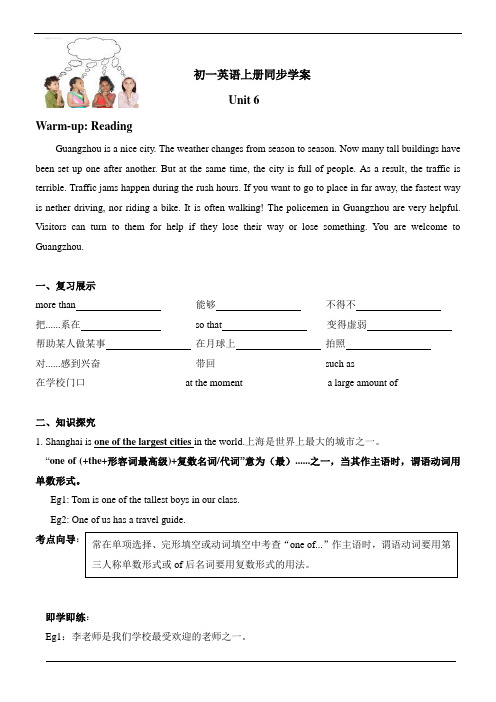
初一英语上册同步学案Unit 6Warm-up: ReadingGuangzhou is a nice city. The weather changes from season to season. Now many tall buildings have been set up one after another. But at the same time, the city is full of people. As a result, the traffic is terrible. Traffic jams happen during the rush hours. If you want to go to place in far away, the fastest way is nether driving, nor riding a bike. It is often walking! The policemen in Guangzhou are very helpful. Visitors can turn to them for help if they lose their way or lose something. You are welcome to Guangzhou.一、复习展示more than 能够 不得不把......系在 so that 变得虚弱 帮助某人做某事 在月球上 拍照 对......感到兴奋_______________ 带回___________________ such as______________在学校门口__________________ at the moment_____________ a large amount of___________二、知识探究1. Shanghai is one of the largest cities in the world.上海是世界上最大的城市之一。
人教版英语九年级上册导学案:Unit 6 第六课时导学案

第六课时3a~Self Check知识目标课堂环节§自主学习方案【新词自查】根据句意及首字母提示完成句子。
1.These people were divided into two groups according to their ages.2.Look,a few pear remain on the trees.Let’s pick them.3.It’s said that the potato chips were invented by m istake.4.The hot weather made the milk sour.5.My grandparents often goes shopping with a basket (篮子).§课堂导学方案Step 1完成教材3a-3b的任务【操作案例】1.根据3a所给表格列举出的内容提示,想出些你不喜欢做的事,然后想出一些发明来帮助你,然后和同伴进行交流,写出提要。
(3分钟)2.假设你现在是一名商人,根据3a 写的提要以及3b方框中所给的句型、短语提示写出一篇描述你的新发明的文章,介绍这种新产品并设法卖给你的同学们。
学生完成后评出优秀的作文在班上展示。
(5分钟)环节说明:本节主要是将读、写的任务结合起来不仅锻炼了学生的写作及对语言的综合运用能力,还巩固了学生对目标语言的学习及综合运用。
Step 2完成教材Self Check的任务【操作案例】1.用方框中所给单词的正确形式完成1部分的短文,然后让1位学生朗读短文同时核对答案。
(5分钟)2.用被动语态改写句子。
让5位学生在黑板上做,同时核对答案。
(5分钟)3.查找更多有关你最想了解的一项发明的信息,然后用所给提示写句子。
(4分钟)环节说明:本节主要是针对本单元的主要目标语言进行加强巩固训练,巩固了学生对目标语言的学习、识记和运用。
§当堂评价方案(详见当堂训练部分)。
四年级上册英语导学案-Unit6Meetmyfamily!课时1ALet’slearn人教PEP

教学设计方案一、教学目标1. 知识目标:(1) 能够听懂、会说、会读本课的生词和句子:mother, father, sister, brother, grandmother, grandfather, uncle, aunt, cousin.(2) 能够运用所学句型介绍自己的家人。
2. 能力目标:(1) 能够用英语简单介绍自己的家庭成员。
(2) 能够听懂、会说、会读Let’s do 部分的内容。
3. 情感目标:培养学生热爱家庭、关爱家人的情感。
二、教学内容本课主要教授家庭成员的词汇以及介绍家人的句型。
三、教学重点与难点1. 重点:(1) 能够听懂、会说、会读本课的生词和句子。
(2) 能够运用所学句型介绍自己的家人。
2. 难点:(1) 生词和句子的掌握。
(2) 能够正确运用句型介绍家人。
四、教具与学具准备1. 教具:课件、图片、单词卡片、录音机、磁带。
2. 学具:课本、练习册、铅笔、橡皮。
五、教学过程1. 热身(5分钟)(1) 教师与学生用Hello! How are you? 等进行简单的英语交流。
(2) 引导学生复习已学过的颜色单词:red, yellow, blue, green。
2. 引入(10分钟)(1) 教师出示自己的全家福照片,用英语介绍自己的家人,如:This is my mother. She is a teacher. This is my father. He isa doctor. 等。
(2) 引导学生模仿教师,用英语介绍自己的家人。
3. 呈现新课(15分钟)(1) 教师出示本课的生词和句子,如:mother, father, sister, brother, grandmother, grandfather, uncle, aunt, cousin. 引导学生跟读并模仿。
(2) 教师利用课件和图片,呈现本课的主要句型:This is myHe/She is 引导学生模仿并运用。
Unit6导学案人教版八年级英语上册

Unit 6I’m going to study puter science ?第一课时Section A 1a2c【学习目标】1. 语言知识目标:1) Key words and phrases:grow up , puter programmer, cook, doctor, engineer, violinist, driver, pilot, pianist, scientist, be sure about, make sure,2) Key sentences:①What do you want to be when you grow up?I want to be a/an.....②How are you going to do that?I’m going to ....③Where are you going to work?I’m going to move to ....4.When are you going to start?I’m going to start when I finish high school and college..2. 能力目标:Be able to talk about future intentions.3. 情感目标:树立自己的人生目标,并为之努力,付出行动【学习重难点】1.Name of jobs 2.Be going to do sth. 来表达将要做的事【教学流程】S tep1导:What does she/he do ? What do you want to be when you grow up?Step2 学:(学)自学教材What do you want to be when you grow up?I want to be a/an.....How are you going to do that?I’m going to ....③Where are you going to work?I’m going to move to ....4.When are you going to start?I’m going to start when I finish high school and college..自学要求:姿势端正,零抬头,零发呆,认真研读课本。
人教(PEP)六年级英语上册《Unit 6 The story of rain》导学案

2022年《Unit 6 The story of rain》导学案温馨寄语:Art is long, but life is short. (人生有限,学问无涯。
)学习内容(Learning contents):人教版六年级上册Unit 6 Let’s start Part A Let’s learn Let's find out Let's sing Good to know学习目标(Learning aims)1.听懂、会说、正确读写单词:stream,rain,cloud,sun,vapour. (本节学习重难点)2、能够运用主要句型“Where does the rain come from?”进行询问与作答。
(本节学习重难点)3、能够完成Let's find out的任务。
4、能够听懂、会唱歌曲“Little Water Drop”。
5、了解水结成冰的相关知识。
知识链接:(Knowledge links)e from = be from 来自Where do you come from? = Where are you from?(你来自哪里?)2.把表示自然现象的名词变成形容词,来形容天气状况,如:sun-sunny;cloud-cloudy;rain-rainy;snow-snowy;wind-windy;学习指导(Learning guide)1.自主学习短语stream,rain,cloud,sun,vapour(试读,试翻译,可以借助单词表)2.听懂、会说、正确读写上面的单词(自己能背会并默写)3.根据本节学习到的知识,完成导学案。
(在自学过程中注意记录自己解决不了的问题,以便和他人合作交流)旧知复习(Revision)根据图片完成下面的填空。
What’s the weather like today?(1) (2) (3)It’s ____________. It’s ____________. It’s ____________.自主学习(Self-learning)1.水是我们生活中不可缺少的,还有什么需要水呢?观察下面的图片,写一写吧!What needs water?_Flowers,_______________________________________2.水这么重要,那水来自哪里呢?看图写写吧!Where does water come from?It comes from_______,_______,_______,______……3. 你能正确读出下面的单词吗?你能正确翻译它们的汉语意思吗?来试试吧!(自学,可借助单词表,注意划线部分的发音哦)stream ( ) rain ( ) cloud ( )sun ( ) vapour ( ) water( )4. 你能流利读出下面的句子吗?你知道它们的汉语意思吗?请写出来吧!What does the rain come from?____________________________________________________________.合作探究(Group work)1.你能正确读出下面的单词吗?大声读给你的组员听吧!听谁的发音最正确。
人教版英语八年级上册 Unit 6 Section A 导学案(含答案)

课题:Unit 6 I’m going to study computer science.第二课时Section A ( Grammar focus-3c)学习目标:1、重点单词college(n.) 学院;大学;高等专科学校;education(n.) 教育;medicine(n.) 药;医学;university(n.) (综合性)大学;高等学府;London(n.) 伦等;article(n.) 文章;论文;send(v.)邮寄;发送2、重点词组grow up长大;move to移居到;a race car driver赛车手;take singing lessons 上歌唱课;a cooking school烹饪学校;take acting lessons上表演课;send...to...把……送到……3、重点句式(1).——What do you want to be when you grow up?——你长大想成为什么?——I want to be an engineer.——我想成为一名工程师。
(2).——How are you going to do that?——你打算怎样做?——I'm going to study math really hard.——我打算努力学习数学。
重点难点:重点:1) 复习巩固Section A 部分所学的生词和词组,达到熟练运用的目标。
2) 能够熟练运用一般将来时态的句子来表达自己未来的打算和做法等情况。
难点:1) 掌握一般将来时态的句子结构,并掌握其在不同句式中的句子结构。
2) 熟练运用“be going to+动词原形”表达自己对未来职业的打算。
导学设计:1.完成下面的汉译英。
(1).学院____________(2).教育____________(3).医学____________ (4).大学____________(5).伦敦____________ (6).文章____________(7).邮寄____________2. 找出下列短语和句型。
导学案设计Unit6(Lesson2)

3.细读对话,模仿人物的语气及感情色彩,和同伴排演,然后上前展示。
4.根据下面三幅图片和小组同学改编对话,在班里展示。
5. Pair work:看图,和同伴做对话练习。Is there a…?Yes, there is. /No, there isn’t.
6.在小组里总结字母组合的er or wh的发音规律。并朗读Pronunciation部分的例词。
导学案设计
一、自主学习:
1、阅读对话,推测对话内容。
2、自读对话,回答问题:What’s in the city ? Is there a river in the park ? Is there a farm in the park ?
二、合作探究
1.小组内和同伴交流书中难点,并对不懂的地方进行讨论。
A.on B.in C./
审阅意见
审阅人:
时间
三、达标测评
单项选择。
( )1. Is there a __________ in the park?
A.houses B.river C.grass
( )2. ---Is there a lake ?
, there ___________.
A.aren’t B.is C.isn’t
()3.There is a nature parkthe city.
导学案设计Unit6(Lesson5)
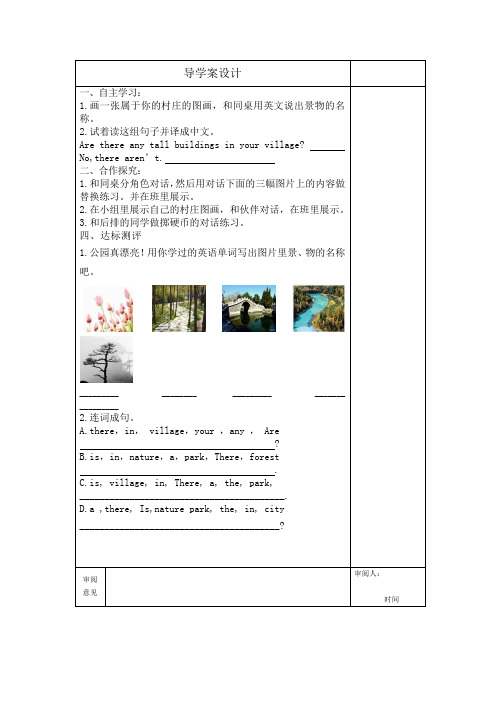
审阅意见
审阅人:
时间
?
B.is,in,nature,a,park,There,forest
.
C.is, village, in, There, a, the, park,
_________________________________________.
D.a,there, Is,nature park, the, in, city
2.在小组里展示自己的村庄图画,和伙伴对话,在班里展示。
3.和后排的同学做掷硬币的对话练习。
四、达标测评
1.公园真漂亮!用你学过的英语单词写出图片里景、物的名称吧。
_________ ________ _________ _______ _________
2.连词成句。
A.there,in,village,your,any,Are
导学案设计
一、自主学习:
1.画一张属于你的村庄的图画,和同桌用英文说出景re there any tall buildings in your village?
No,there aren’t.
二、合作探究:
1.和同桌分角色对话,然后用对话下面的三幅图片上的内容做替换练习。并在班里展示。
七年级下期英语Unit-6I'm-watching-Tv.导学案

Unit 6 I'm watching TV. 第一课时Section A 1a~1C主备人:石静课型:新授课使用学生:时间【预习重点】:1. 试读下列单词、短语:clean, read, on, watching TV, cleaning, eating dinner, reading, talking on the phone,using the computer,Making soup,washing the dishes,exercising.2. 朗读下列句子:---What are you doing? ---I'm watching TV.---What is he doing? ---He is reading.现在进行时1.语法含义:表示现在( 指说话人说话时) 正在发生的事情或进行的动作。
常与look, listen, now等标志词连用。
基本用法:(歌诀:现在进行莫用错,须看时间和动作;look, now和listen,时态标志词记在心。
)2.结构:“主语+be(am/is/are)+动词的现在分词”(V-ing)(歌诀:现在进行要注意,有be还有ing;be的形式看主语,分词构成要留意。
)现在分词的构成歌诀:-ing,词尾加;以e结尾删掉它,重闭双写牢记它。
注:不发音的“e”结尾的词要去“e”再加-ing,(making,dancing,using,writing,taking)(要发音的如see不能去掉,直接加ing)需要双写结尾字母的动词的现在分词:swim ming, sit ting, begin ning, shop ping, run ning, get ting.【前侧】一、根据汉语,写出英语短语。
做作业:看电视:打扫:吃晚餐:阅读:打电话:听CD:使用电脑:做汤:洗盘子:练习:二、写出下列动词的现在分词形式:do______ read_______ wash_______ listen_______write________take_______use ______ make________exercise________see_________swim_________shop________get_________三、按要求写出下列句子:1.Lily在干什么?她在打电话。
Unit 6 How many?Phonemic Awareness(导学案)人教PEP版英语三年级

Unit 6 How many?Phonemic Awareness(导学案)人教PEP版英语三年级下册一、课前预习1.学习本单元的课文,掌握单词及句型。
2.复习数字 1-20,并尝试用英语问、答存在图片中物品的数量,例如:“How many dogs are there?”“There are three dogs.”二、学习目标1.掌握表示数量的词汇,如one, two, three, four等;2.学习使用how many表示数量的疑问句;3.通过听、说、读、写等多种方式提高语言技能。
三、学习重点和难点1.重点:了解how many的用法,学习数字表达法;2.难点:理解数量的概念,掌握how many疑问句的语调。
四、学习内容和方法学习内容1.学习how many疑问句的用法;2.学习数字表达法,如“one, two, three”等;3.进行听、说、读、写等多种方式的练习。
学习方法1.配合教师课堂上的教学,认真跟读和朗读;2.大胆练习英语交流,增加语言输出的机会;3.利用网上资源、教材小应用、学习卡片等多种工具进行学习。
五、学习方式1.听力训练:通过听语音、听歌曲、配对图片等方式提高英语听力;2.朗读训练:通过朗读练习、模仿播音员等方式提高英语口语;3.写作训练:通过写单词、句子、作文等方式提高英语写作;4.游戏学习:通过竞赛、小游戏等方式让英语学习变得有趣。
六、学习计划时间任务第1周听语音、朗读、模仿第2周写作练习、测验第3周竞赛、小游戏七、学习评价1.考查学生的英语口语、听力、写作等技能;2.给予积极肯定和指导。
八、布置作业1.通过网上录音工具,完成如“How many ducks are there?”“There are three ducks.”等句型基础的录音训练;2.完成英语单词卡片练习。
九、学习反思1.发现问题;2.补充策略;3.记录反思。
六年级下册英语导学案-Unit6 General Revision 3 Task 11 |人教精通版
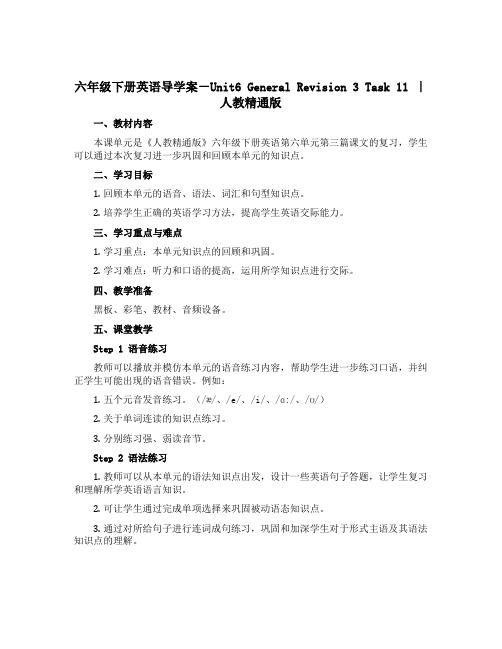
六年级下册英语导学案-Unit6 General Revision 3 Task 11 |人教精通版一、教材内容本课单元是《人教精通版》六年级下册英语第六单元第三篇课文的复习,学生可以通过本次复习进一步巩固和回顾本单元的知识点。
二、学习目标1.回顾本单元的语音、语法、词汇和句型知识点。
2.培养学生正确的英语学习方法,提高学生英语交际能力。
三、学习重点与难点1.学习重点:本单元知识点的回顾和巩固。
2.学习难点:听力和口语的提高,运用所学知识点进行交际。
四、教学准备黑板、彩笔、教材、音频设备。
五、课堂教学Step 1 语音练习教师可以播放并模仿本单元的语音练习内容,帮助学生进一步练习口语,并纠正学生可能出现的语音错误。
例如:1.五个元音发音练习。
(/æ/、/e/、/i/、/ɑ:/、/ʊ/)2.关于单词连读的知识点练习。
3.分别练习强、弱读音节。
Step 2 语法练习1.教师可以从本单元的语法知识点出发,设计一些英语句子答题,让学生复习和理解所学英语语言知识。
2.可让学生通过完成单项选择来巩固被动语态知识点。
3.通过对所给句子进行连词成句练习,巩固和加深学生对于形式主语及其语法知识点的理解。
Step 3 词汇练习教师可以针对本单元的主题词汇及重点词汇,设计相关的单词填空、词义辨析、选词填空等题目。
例如:1.填入合适的单词:My favorite fruit is ___________ (apple/banana).2.选词填空:In winter, I like to drink _____ (hot/cold) chocolate.3.词义辨析:The ___ (hear/here) is a musical instrument.Step 4 句型练习教师可以设计相关的英语对话、小短文等形式的语篇来练习句型运用能力。
例如:1.My favorite food is pizza. What about you? (介词“about”的用法和yes/no问句的回答)2.I play sports every day. (一般现在时的用法)3.He can swim and play basketball well. (can 的用法)Step 5 听力练习教师可以播放单元中的听力材料,要求学生认真听,并回答问题。
- 1、下载文档前请自行甄别文档内容的完整性,平台不提供额外的编辑、内容补充、找答案等附加服务。
- 2、"仅部分预览"的文档,不可在线预览部分如存在完整性等问题,可反馈申请退款(可完整预览的文档不适用该条件!)。
- 3、如文档侵犯您的权益,请联系客服反馈,我们会尽快为您处理(人工客服工作时间:9:00-18:30)。
华亭三中九年级英语学科导学案【导学提纲】定语从句一. 定义:在复合句中,修饰名词或代词的从句叫定语从句。
被修饰的词叫先行词。
I like music that/which I can dance to .先行词引导词定语从句二. 定语从句的引导词。
①关系代词:that who whom whose which ②关系副词:when where how…三. 关系代词的用法四. 注意事项(一)表示事物时,只能用that引导的定语从句。
1.先行词为:all ;everying ;nothing ;something ;anything ;much ;little 和few 等不定代词时只能用that 。
如:This is all that I want to say.2.先行词被序数词,形容词最高级修饰时,只能用that 。
The first lesson that I learned will never be forgotten .3.先行词被the very;the only;the same ; the last 修饰时,只能用that 。
This is the very book that I want to buy.”4. 先行词既包括人也包括事物时,只能用that 。
They talked of the things and persons that they remembered in the factory .(二)表示事物时,当关系代词前使用介词只用which。
但“介词+ which”可换成表时间的when;表地点的where;表原因的why。
Beijing is the place in which I was born . (in which = where)(三)指人时,先行词为everybody;anybody;everyone;anyone时要用who。
Anyone who has questions call me at 0435-394033.【当堂检测】一. 用“who”或“that”填空。
1. The man ________ is talking with my mother is my father .2. That book is the one _______ I bought yesterday .3. He is one of the workers ________ been saved in that accident .4. They talked of the things and persons ________ they remembered in the factory .5. All ______ can be done must be done .二. 句型转换1. I prefer singers. The singers write their own lyrics.(合并为一个句子)I prefer singers _________ _________their own lyrics.2. I prefer groups. The groups play quiet and gentle songs.(合并为一个句子)I prefer groups _________ _________quiet and gentle songs.3. I like music . The music makes me excited . (合并成一个复合句,09年会考题)I like music me excited .4. The driver of the bus is Rod . He bought a red car last year . (合并成一个复合句)The driver of the bus a red car last year is Rod .三. 定语从句与会考()06. The songs Jay Zhou sings are popular with students .A. whyB. whomC. whatD. which()07. The green tea grows in South China is quite popular in China .A. whoB. whichC. whenD. where()08. This is the girl mother is an English teacher of our school .A.thatB. whoC. whomD. whose()10. Do you like music makes you relaxed ?A. itB. whatC. whoD. that()11. Maori , a little dog , is the only one is alive after the terrible Tsunami (海啸)A. thatB. whichC. whoseD. what【导学提纲】1. prefer 动词。
更喜爱,更喜欢,相当于like…better…than 。
其过去式、过去分词为preferred , 常用于以下结构:① prefer + 名词、代词 I preferred music.② prefer to do = prefer doing sth 更喜欢做某事I prefer living abroad. = I prefer to live abroad.常见的搭配:① prefer sth to sth 喜欢……而不喜欢……(to 为介词) She prefers apples to bananas. ② prefer doing to doing 喜欢做某事而不喜欢做某事(to 为介词)He prefers running to walking.③ prefer to do sth rather than do sth = would rather do sth than do sth 宁愿做某事而不愿做某事2. along with 伴随… 同… 一道① I will go along with you. 我同你一道去。
② I sing along with music. 我伴随着音乐唱歌。
3. dance to sth. 随着…跳舞 She likes dancing to the music. 她喜欢随着音乐而跳舞。
4. different kinds of 各种各样 different kinds of clothes 各种各样的衣服5. ① music 名词. 音乐 ② musician 名词. 音乐家③ musical 形容词. 音乐的;音乐家的 6. quiet and gentle songs 轻柔的歌曲【当堂检测】1. I always prefer _______(get) up early rather than______(go) to school without breakfast.2. I prefer ________(eat) hamburgers.3. Tom prefers _______(read) books to __________(watch) TV .4. She prefers ________(walk) to school rather ________(take) a bus to school.5. She would rather lie in bed than go to school. (写出同义句)= She__________ to lie in bed ________ _______ go to school.6. 我喜欢我可以随着一起唱的音乐。
I like music that I can sing _________ _________.【导学提纲】1. take … to … 带…去…. 如:My father often takes me to the park. 我的爸爸经常带我去公园。
Please take this box to my office. 请拿这个盒子到我的办公室。
2. the name of “……的名字”3. ① some of +可数名词复数 “……中的一些”② one of +可数名词复数 “……中的一个”4. ① remind of 提起、使记起② remind sb of sth 使某人想起某事 This film remind me of the war year.5. 询问对“某人/某事”的看法用句型:What do you think of … ? = How do you like …?6. can’t stand “不能忍耐”, 其后跟名词、代词、Ving 。
7. be important to sb. 对…重要That’s not really important to me. 那对我而言并不重要。
【当堂检测】1. Some of the (sing) don ’t sing the words clearly .2. I prefer (swim) to skating .3. Xu Peidong and Qiao Yu are both great (music)4. I prefer singer who (write )his own lyrics .1. 我喜欢自己创作曲子的歌手。
I love singers .2. 我们更喜欢歌词很棒的曲子。
We prefer music that.3. 你不喜欢这张CD 的什么? do you dislike this CD.4. 它使你想起了什么?What it you ?5. 这首曲子使我想起了巴西舞曲。
The music Brazilian dance music.【导学提纲】1. over the years “这些年”, 常和现在完成时态连用。
He has made some great movies over the years.2. 助动词“does\do\did” 用在肯定句和祈使句。
形成“ does\do\did+V ”结构。
对谓语动词进行强调。
意思为“的确,真的,务必”①He does speak English well. 他英语确实讲得好。
②Do came and see me next week. 务必下周来看我。
3. though == although 虽然,尽管。
